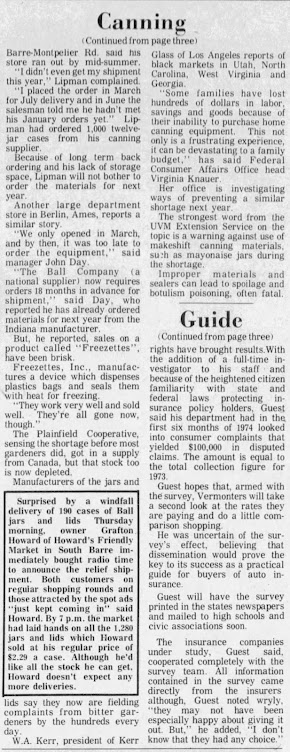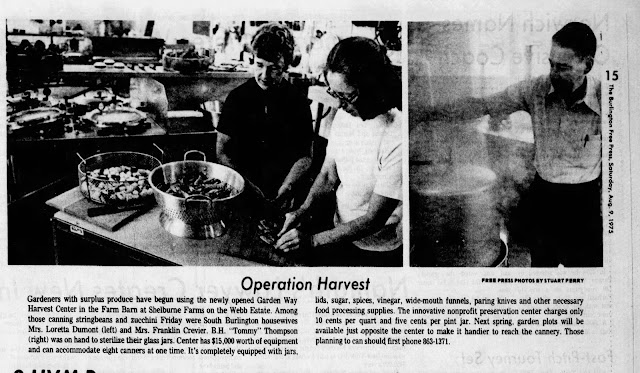BACG History Post #17
On September 7, 1974, the Barre-Montpelier Times Argus reported that canning jars, lids, and supplies were in short supply. Local retailers were challenged by long lead times, back orders, and limited storage space for canning jars.
Canning and preserving workshops were held across Vermont. Freezer lockers were rented by gardeners. Community canneries were proposed as a solution for safely preserving the harvest.
The concept of community canneries was not new. In 1934, the Food Conservation Program was implemented as part of the Works Progress Administration (WPA) - which became the Works Projects Administration in 1939. The WPA was one of Franklin D. Roosevelt's New Deal plans to alleviate the Great Depression by providing public works projects to stimulate employment and the economy.
Under the Food Conservation Program, community canneries were designed to thwart hunger and train people in the proper methods of food preservation. During WWII, the cannery program was vital to supporting the efforts of Victory Gardeners to boost home food production.
By the end of WWII, there were over 3,800 community canneries in the U.S. The local canneries phased out after the war as federal subsidies waned. Large scale agriculture and commercial canneries expanded, providing cheap canned goods for grocery stores and supermarkets.
Gardens for All had a potential dilemma on its hands. Scenes of surplus garden produce going to waste could counteract the perceived public benefits of community gardening. Tommy Thompson and Judi Loomis came up with a plan.In the spring of 1975, Gardens for All moved its field operations from the Garden Way Associates headquarters in Charlotte to Shelburne Farms, which had become a nonprofit in 1972.
Thompson and Loomis envisioned a modern well-equipped community cannery as a social way to can and preserve food. They secured $15,000 of food preservation equipment through a grant. Word spread quickly through local newspapers, the Burlington Farmers Market, and Gardens for All newsletters.
The Garden Way Harvest Center opened in July at the north end of the multi-storied Farm Barn at Shelburne Farms. Thompson and Loomis, along with Sky Thurber of Gardens for All, assisted gardeners, homesteaders, and local food enthusiasts in processing vegetables, fruits, meat, and fish.
The Harvest Center housed canning and drying equipment, a cider press, and a honey extractor. The cost to use the facility was modest, 10 cents a quart and 5 cents a pint.
The Harvest Center operated for at least three years at Shelburne Farms. An article in the November 27, 1977 Times Argus reported that 150 families community gardened at Shelburne Farms that year. Truck gardeners were allowed to lease up to two acres of land.



